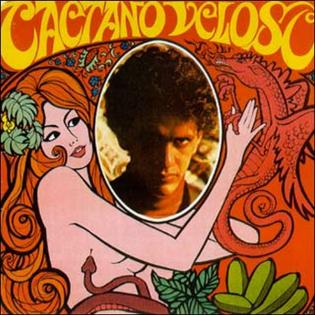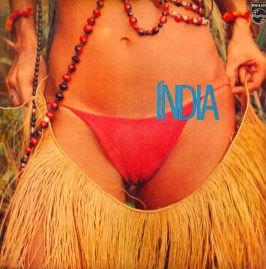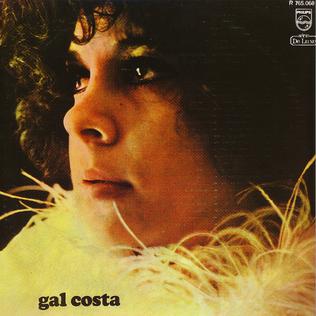
Caetano Emanuel Viana Teles Veloso is a Brazilian composer, singer, guitarist, writer, and political activist. Veloso first became known for his participation in the Brazilian musical movement Tropicália, which encompassed theatre, poetry and music in the 1960s, at the beginning of the Brazilian military dictatorship that took power in 1964. He has remained a constant creative influence and best-selling performing artist and composer ever since. Veloso has won nine Latin Grammy Awards and two Grammy Awards. On 14 November, 2012, Veloso was honored as the Latin Recording Academy Person of the Year.

Gilberto Passos Gil Moreira, is a Brazilian singer-songwriter and politician, known for both his musical innovation and political activism. From 2003 to 2008, he served as Brazil's Minister of Culture in the administration of President Luiz Inácio Lula da Silva. Gil's musical style incorporates an eclectic range of influences, including rock, Brazilian genres including samba, African music, and reggae.
Tropicália, also known as tropicalismo, was a Brazilian artistic movement that arose in the late 1960s. It was characterized by the amalgamation of Brazilian genres—notably the union of the popular and the avant-garde, as well as the melding of Brazilian tradition and foreign traditions and styles. Today, tropicália is chiefly associated with the musical faction of the movement, which merged Brazilian and African rhythms with British and American psychedelia and pop rock. The movement also included works of film, theatre, and poetry.

Eduardo de Góes "Edu" Lobo is a Brazilian singer, guitarist, and composer.

Joyce Moreno, commonly known as Joyce, is a Brazilian singer-songwriter and guitarist.

Gal Maria da Graça Costa Penna Burgos, known professionally as Gal Costa ( ), was a Brazilian singer of popular music. She was one of the main figures of the tropicalia music scene in Brazil in the late 1960s and appeared on the acclaimed compilation Tropicália: ou Panis et Circencis (1968). She was described by The New York Times as "one of Brazil's greatest singers."

Sinatra and Strings is the twenty-fourth studio album by American singer Frank Sinatra consisting of standard ballads. It was arranged by Don Costa.

Torquato Pereira de Araújo Neto was a Brazilian journalist, poet and songwriter. He is perhaps best known as a lyricist for the Tropicália counterculture movement, which later expanded its influence to Música popular brasileira. He worked with Gal Costa, Gilberto Gil, Edu Lobo and Waly Salomão. He died by suicide at the age of 28.
Celso Fonseca is a Brazilian composer, producer, guitarist and singer. He is noted as part of the Música popular brasileira since the 1980s, initially as accompanist and composer, then producer, and since the mid–1990s as an artist in his own right.

Caetano Veloso is the debut solo album by the artist of the same name, released in Brazil in 1968. He had released Domingo the year before in collaboration with Gal Costa. It was one of the first Tropicália efforts, and features arrangements by Júlio Medaglia, Damiano Cozzella, and Sandino Hohagen, as well as an eclectic assortment of influences, demonstrating the "antropofagia" of the Tropicália movement. Sounds from psychedelia, rock, pop, Indian music, bossa nova, Bahian music and other genres appear on the album. It includes the hit songs "Alegria, Alegria", "Tropicália", and "Soy loco por ti, América".

Caetano Veloso is the third self-titled album by Caetano Veloso. It was recorded in England, when the artist was in an exile imposed by the Brazilian military dictatorship for being subversive. It is mostly sung in English and portrays a sad tone throughout, reflecting his feelings about homesickness and the absence of his family and friends. It was released first in Europe, and then in Brazil, in 1971.

Hélio Oiticica was a Brazilian visual artist, sculptor, painter, performance artist, and theorist best known for his participation in the Neo-Concrete Movement, for his innovative use of color, and for what he later termed "environmental art," which included Parangolés and Penetrables, like the famous Tropicália. Oiticica was also a filmmaker and writer.

Jaques Morelenbaum is a Brazilian instrumentalist, arranger, conductor, composer and music producer.

Água Viva is an album by Brazilian singer Gal Costa, released in 1978. The album contains hits such as "Paula e Bebeto", which was included in the soundtrack of the Brazilian TV series, Malu Mulher.

Recanto is an album by Brazilian singer Gal Costa, released in 2011. The album was written and produced by Caetano Veloso.

Índia is the fourth studio album by Brazilian singer Gal Costa, released on 1973 by Philips Records. Its major hits were "Índia", "Volta" and "Desafinado".

Gal Costa is the first solo album by the Brazilian singer Gal Costa, released in 1969. It was ranked the 80th best Brazilian album of all time by the Brazilian Rolling Stone magazine.

Gal or Gal Costa is the second album by Brazilian singer Gal Costa, released months after the first album Gal Costa. To distinguish it from Costa's previous release, the album is sometimes referred to as Cinema Olympia, the title of its first track. It is considered by the public and critics alike as her most psychedelic and experimental album. The music in the album has been considered unprecedented. Andy Beta of The Pitchfork Review described the album as "the equivalent of Barbra Streisand recording with Boredoms" and "one of the heaviest documents of Tropicália."

Cantar is the fifth solo album by the Brazilian singer Gal Costa, released in 1974. It was ranked the 91st best Brazilian album of all time by the Brazilian Rolling Stone magazine.
"País Tropical" is a song composed by Brazilian singer and composer Jorge Ben Jor. The song was originally recorded by singer Wilson Simonal on 22 July 1969. It was released the following month, and became the biggest hit of the singer's career. In December of that year two more versions of the song were released: One by Gal Costa, and one by composer Jorge Ben Jor.

















